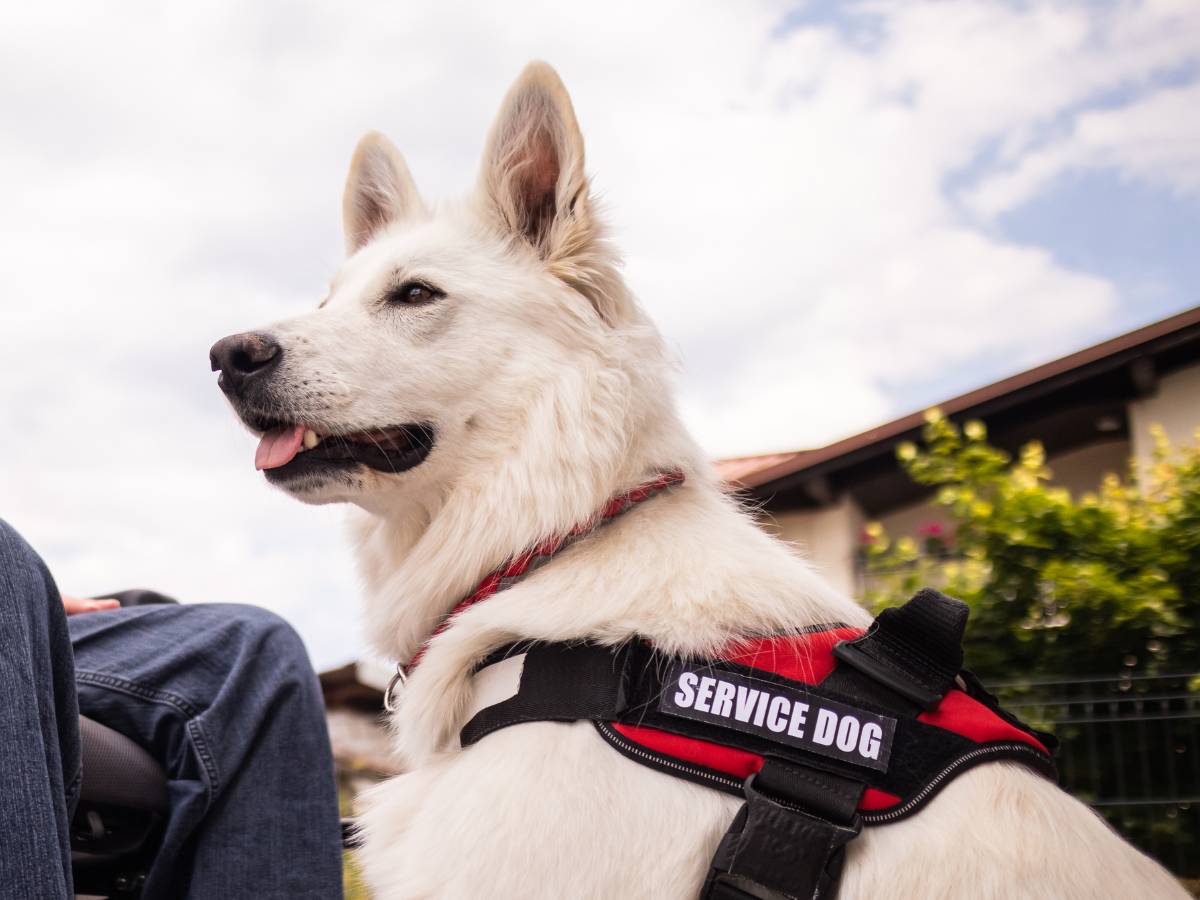Service Animals in the Inland Empire: Everything Landlords Need to Know
Stretching across Riverside and San Bernardino counties, the Inland Empire is a place that’s constantly growing and changing. It’s home to everything from massive logistics centers and military communities to college towns and suburban neighborhoods. People often move here for more space and affordability, typically coming from larger cities like L.A. or San Francisco. That means landlords will encounter a wide range of tenants, each with their own unique needs.
One request that often catches landlords off guard is when tenants ask to keep service animals in the Inland Empire. These animals have a special legal status, helping people with disabilities live independently. As a landlord, not knowing the difference between service animals versus pets or even asking the wrong question can get you in trouble.
This guide will explain everything you need to know about service animals in the Inland Empire, including what makes them different from pets and emotional support animals (ESAs), when you must accept them, and how to document them correctly. By the end, you’ll understand how to stay legally compliant while creating a harmonious living environment for your tenants.
What Is a Service Animal?
According to the Americans with Disabilities Act (ADA), service animals in the Inland Empire are any breed of dog, and in some cases, a miniature horse. What makes them different is the type of training they receive and the purpose they play in the lives of their owners. Service animals must be individually trained to perform a task (or multiple tasks) that directly relate to a person’s disability, which can be physical or mental. These tasks provide practical, everyday support that tenants would not be able to function well without, such as:
- Picking up items that someone in a wheelchair can’t easily reach
- Guiding a person who is blind or visually impaired so they can get around safely
- Reminding someone to take their medication
- Providing balance and stability for those with mobility challenges
- Alerting someone before a seizure or dangerous blood sugar change
- Interrupting panic attacks or harmful behaviors in people with PTSD or autism
These jobs aren’t “tricks,” but essential to the health and safety of the people who own service animals. That’s why they’re treated differently than pets, not just under the ADA, but also in housing situations by the Fair Housing Act (FHA) and California’s Fair Employment and Housing Act (FEHA). All of this means that even if your lease doesn’t allow animals, service animals in the Inland Empire must be allowed inside without restrictions.
Service Animals vs. Emotional Support Animals vs. Pets
In everyday conversations, people often blur the lines between service animals versus pets, and even get them mixed up with ESAs. Legally, the three types of animals are very different, and understanding why can help you make the right decision when faced with a request.
- Service animals: These are trained dogs or miniature horses covered by the ADA, the FHA, and statewide FEHA. You can’t charge fees, deposits, or pet rent for them, and you also can’t deny them based on size or breed. They do not require documentation, and you can only ask two questions to their handlers to confirm that they’re a service animal.
- Emotional support animals (ESAs): ESAs are any type of animal (not just dogs or miniature horses) that provides comfort to someone living with a mental health disorder. Because they don’t perform a specific task, they aren’t covered by the ADA, but they are protected in housing under FHA and FEHA. These animals must be documented with a letter from a California-licensed provider under AB 468. This letter must include the provider’s license details, a clinical evaluation of the tenant, and be based on a minimum 30-day provider-patient relationship.
- Pets: Pets are any type of animal kept for companionship and enjoyment. They aren’t legally protected, which means landlords can regulate them with deposits, monthly rent, breed or size restrictions, or even bans.
While you don’t have to allow pets or ESAs into any restaurants or stores you own in the Inland Empire, you do have to accommodate ESAs and service animals in your rental units.

Questions You Can Ask and Documents You Can Request
When you receive requests for service animals in the Inland Empire, it’s normal to want more information. Both service animals and ESAs are considered reasonable accommodations in housing situations, even if your property has a no-pet policy in place. If the tenant provides documentation for an ESA, you must allow it into the unit.
While you cannot ask for documentation from service animals in the Inland Empire, you can ask two specific questions, but only if the person’s disability and the animal’s role aren’t obvious:
- Is the animal required because of a disability?
- What task(s) has the animal been trained to do?
Asking further questions about the tenant’s diagnosis or requesting medical documentation is against the law. You’re also not allowed to ask where the animal received training or require that it wear a vest or badge indicating that it’s a service animal. Instead of letting your curiosity guide the conversation, let respect take the lead. You’re more likely to stay compliant that way.
If you’re dealing with an ESA request, however, the rules are a bit different. You’re allowed to ask a tenant with an ESA to give you a letter from their healthcare provider that states:
- The tenant has a qualifying physical or psychiatric condition
- The ESA assists with one or more symptoms of that disorder
- The tenant has been seeing the provider for at least 30 days and has developed a genuine relationship with them
When it comes to handling service animals in the Inland Empire, it can help to designate someone as your main point of contact for requests, such as your property manager. You could also consider setting up an online form or an FAQ section that explains how to request accommodation. This shows tenants you care about their comfort and well-being.
When Landlords Can Legally Deny Service Animals
In most cases, you can’t deny a valid service animal from staying in your property because they’re covered by the ADA and FHA. Even if you have a no-pet policy, service animals aren’t treated as pets. However, the law does allow you to deny an accommodation under very specific circumstances:
- Having the animal would create undue financial strain or administrative burden
- The animal is a threat to the health or safety of other tenants, and there are no reasonable steps that would reduce the risk of harm
- Allowing the animal in the property would fundamentally alter the rental services you provide
- The animal has a history of causing major property damage
- The animal is not housebroken
Landlords generally don’t deny service animals in the Inland Empire because they make a good-faith effort to provide a reasonable accommodation. Even if you are afraid of animals, allergic, or have tenants who chose your property because it’s pet-free, none of those are valid reasons for denial. Making a mistake in this area could lead to legal battles where both your income and reputation are on the line.
If you ever need to deny a request, ensure the reason is well-documented to protect yourself legally in case the tenant submits a discrimination complaint. Being transparent with tenants can prevent misunderstandings and conflict, making the process much easier for both parties. If you’re ever in doubt, bring an attorney on board to get your questions answered before a mistake is made.
It’s also worth noting that California law takes misrepresentation very seriously. Tenants who try to pass off their pet as a service animal or ESA can be charged with a misdemeanor and face both fines (up to $1,000) and jail time. These rules are designed to protect landlords from fraudulent claims while ensuring that tenants with legitimate needs are supported, encouraging honesty from both sides.
When Service Animals in the Inland Empire Can Be Added to the Lease
Service animals in the Inland Empire can be added to the lease at any time, not just before signing the lease. While many tenants will tell you about their service animal as a courtesy, they aren’t legally required to. However, if they need an exemption from a rule you have, like a pet deposit or a complete ban, they’ll have to be forthcoming. Once you’re aware of a service animal, it can be helpful to document it with a lease addendum that includes:
- A statement confirming the animal is a service animal, not a pet
- “House rules” (like leashing the animal in hallways and common areas, if able, and cleaning up after it outside)
- Expectations for behavior, including noise levels, cleanliness, and interactions with other tenants (including a no-tolerance policy for aggression or disturbances)
- A statement that the tenant is responsible for any damage the animal causes
Although tenants with service animals aren’t subject to pet fees, you are allowed to charge them for damage the animal causes or use their security deposit to cover the repairs. Service animals may have extra legal protections, but they can still be held to many of the same rules the other tenants are. This allows landlords to maintain a safe, inclusive environment for all tenants. If a service animal starts to pose problems, whether to the property itself or to other residents, landlords may have the right to request that the animal be removed.
Wrapping Up: Accommodating Service Animals in the Inland Empire
Service animals in the Inland Empire are not pets, but highly trained companions that give people with disabilities the freedom to live safe, independent lives. That’s why both state and federal laws give them such strong protections. For landlords, the key is knowing the difference between service animals vs. emotional support animals vs. pets and handling each request with care.
By sticking to the two questions the law allows, respecting tenant privacy, and keeping good records, you do more than stay compliant. You create a community where tenants feel welcome and supported. In a place as diverse as the Inland Empire, that trust can go a long way. It keeps tenants happy, protects your property, and reduces the risk of costly legal issues.
When it comes to service animals in the Inland Empire, landlords can’t afford to get it wrong. The good news is, with a property management company like Evernest, you don’t have to figure it out alone. Reach out to Evernest’s Inland Empire property management team today, and let our local team take care of the details so that you can focus on growing your rental business with confidence.

